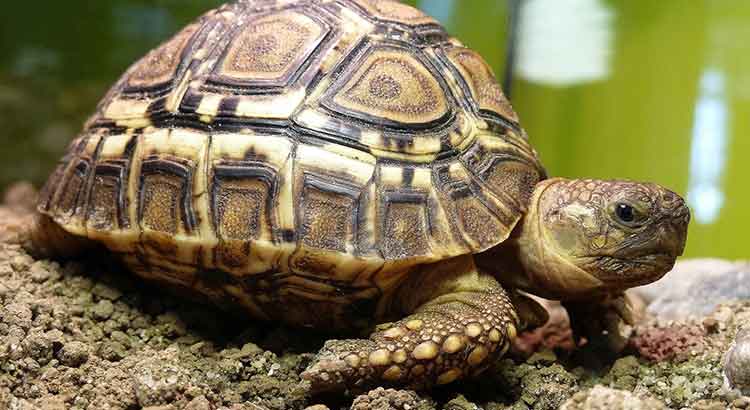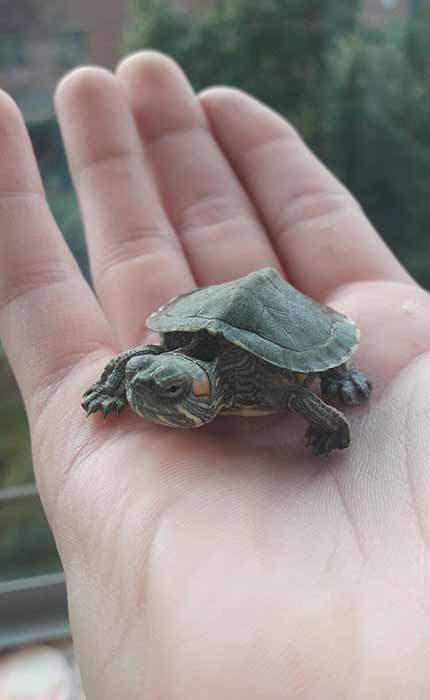Leopard tortoises seem to be really small and cute tortoises, but will they stay that small forever, or will they grow a lot bigger? Let’s find out.
On average, a Leopard tortoise will reach a size between 24 and 28 inches (61 and 71 centimeters), with the females being slightly bigger than the males. Other factors that influence the size of a Leopard tortoise are their diet, the habitat in which they live, and the access to UVB light.
Another important factor is genetics, just like humans some Leopard tortoises will grow bigger than others, but there is no way of knowing this, so let’s focus on the things that I mentioned earlier.
How the Diet of a Leopard Tortoise Influences Its Size
The most significant thing, that will influence the size of a Leopard tortoise, is its diet. A Leopard tortoise that has a balanced diet will be able to reach a size of about 28 inches in 10 to 12 years. While a poorly feed, Leopard tortoise won’t usually grow as big, and it will take longer. So, let’s take a look at the diet of a Leopard tortoise.
Leopard turtles are vegetarian, which means that they will eat fruits, vegetables, plants, but not insects, and meat.
When they are young, Leopard tortoises grow at an accelerated rate, and as they get older the growth slows down considerably. This means that what they need to eat will differ drastically on their age.
If you want to know how fast Leopard tortoises grow, you can check out this article: Leopard Tortoise Growth Rate | How Fast Do Leopard Tortoises Grow? Where I discuss things in more detail.
A young Leopard tortoise will need a lot more proteins than an older one, so they will be somewhat more selective with their food.
As Leopard tortoises get older their growth rate slows down, so they don’t need as many proteins, and their diet will become more balanced.
In general, pet Leopard tortoises will grow faster and bigger than their wild counterparts because they have a better and richer diet. But the difference is size is usually not bigger than 0.5 to 1 inch (1 to 2 cm), but the speed at which the tortoise grows will be significantly different.
How the Habitat of a Leopard Tortoise Influences Its Size
On average, pet Leopard tortoises will grow slightly bigger than wild Leopard tortoises, due to the better living conditions, better diet, and better UVB light (which we will discuss next). But there is one thing that creates a bigger difference between the two, and that is hibernation.
When it gets cold outside, tortoises will hibernate, which basically means that they will sleep, until it gets warmer.
Tortoises do this for two main reasons, the first one is that when it’s cold there are little to no plants that they can eat, so if they were not to hibernate they would starve.
The second reason why they do this is that all tortoises are cold-blooded animals, which means that they can’t generate any body heat of their own, so they have to rely on the environment to keep their bodies warm.
When tortoises hibernate they are basically switching to a very low power mode, in which they stop all non-essential body functions, and use all the energy that they have stored to keep vital function running. So, tortoises won’t grow at all during this time.
Tortoises start entering a hibernation state when the temperature drops, so in the case of pet tortoises, unless you intentionally drop the temperature in your home very low, they won’t hibernate.
All this means that pet tortoises can grow 12 months a year, while wild tortoises only for about 8 or 9 months, depending on the weather.
UVB Light
Tortoises need two things in order to grow, proteins for their muscles, and calcium for their shell.
The calcium usually comes from a wide range of plants that they eat. But just eating those plants isn’t enough, they also need to absorb the calcium in their body, and they can’t do this without vitamin D3, which comes from the UVB light.
UVB light is a type of light that is naturally produced by the sun, but can also be created with special light bulbs. If tortoises don’t spend enough time in direct UVB light, they won’t be able to properly assimilate the calcium, and this will stop them from growing.
In the wild, tortoises get UVB light by basking. When tortoises bask, they try to find a place where the sun’s rays are very powerful, so they usually climb on big rocks or any place that is closer to the sun. When they find the best spot, they simply lay in the sun for hours. During this time, they are absorbing the UVB rays, but also regulating their body temperature.
Pet tortoises have basking areas that are equipped with a UVB Bulb, that replicates the effects of the UVB rays that come from the sun.
A tortoise that doesn’t have access to UVB will have much slower growth or none at all. In the wild, there are places that are more exposed to the sun than others, and tortoises will typically search until they are able to find a place that offers a good amount of UVB light. But in some areas with very dense vegetation, such spots are hard to find, which leads a lot of tortoises to create stacks, like the ones in this picture.
If you want to know more about tortoise stacks and how they work, you can check out this article: Why Do Tortoises Stack? (with Pictures and Videos)
Pet tortoises are almost entirely reliant on the UVB Bulbs. In general, most UVB bulbs will get the job done, but if you want to know more details about, and the different types that are available, then you should read my article: Guide for Lighting and Heating a Tortoise Tank and Basking Area, there you will find a lot more information on this subject.
Final Thoughts
So, on Leopard tortoises can reach sizes between 24 and 28 inches (61 and 71 centimeters) with the females being slightly bigger than the males.
The factors that influence their size are:
- The diet, the more access they have to proteins when they are young, the bigger and faster they will grow.
- UVB light, without proper access to it, tortoises won’t be able to absorb the calcium, and they won’t be able to properly grow.
- The habitat, wild tortoises won’t always have the best conditions, and they will also have to hibernate, while pet Leopard tortoises have all of their needs taken care of and don’t have to worry about hibernation.
Related Questions
How do I keep my tortoise small? You can’t keep a tortoise small, any attempt to do so will only affect its health. If you want a small tortoise then you should get a tortoise species that stay small, here you can find a list of tortoises that stay small and don’t grow: Best Pet Tortoises That Stay Small and Don’t Grow
How can I make my tortoise grow faster? The only way that you can make a tortoise grow faster is to ensure that it has everything that it needs, a proper diet, a proper tank, and a proper basking area.
Do tortoises grow to the size of their tank? No, how big a tortoise will grow depends on its species and the living conditions. If you have a very small tank, there is a good chance that your tortoise will outgrow it.


